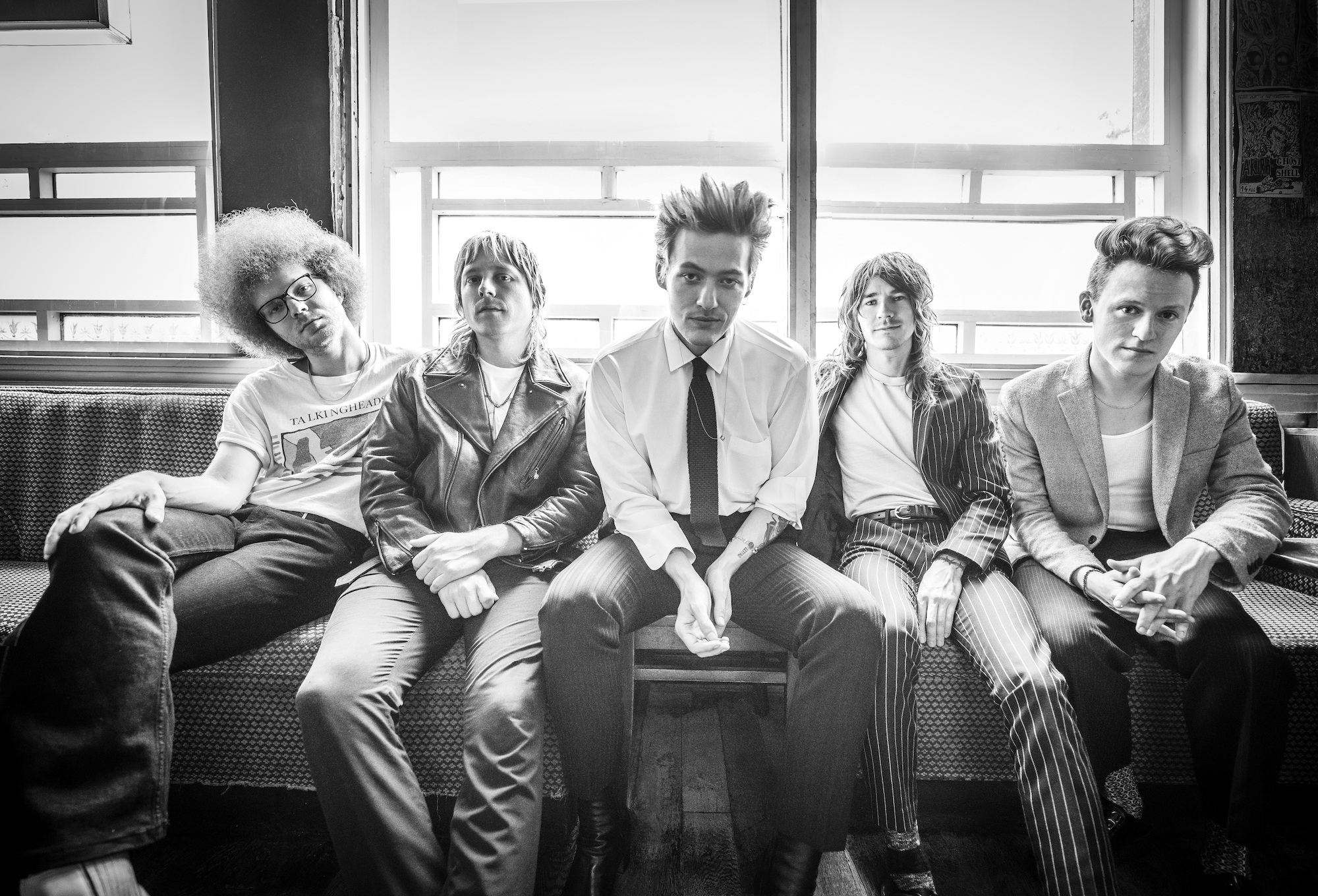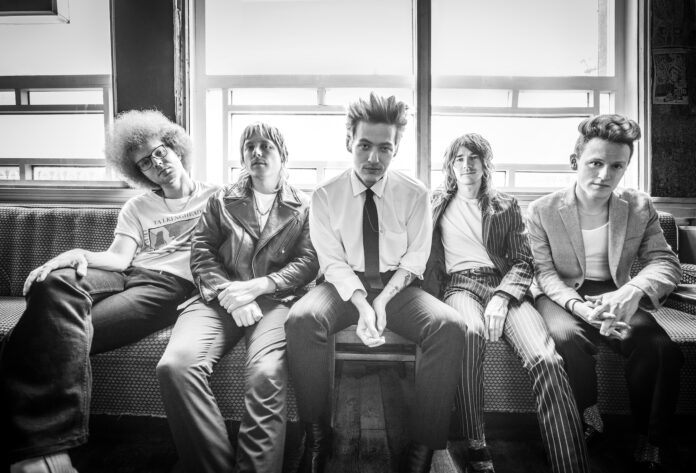
A decade ago, Wes Leavins was just a high school student in Port Arthur, Texas who was obsessively spinning his family’s record collection, trying to finding his voice and looking for a way out of his small town through music. Eventually, it would lead to the foundation of his buzzed-about music project, Brigitte Calls Me Baby, named after a brief penpal relationship with French actress Brigitte Bardot.
A year after their first gig in 2022 opening for Irish band Inhaler, Brigitte Calls Me Baby caught the attention of ATO Records with a performance at South by Southwest and were quickly signed to the label. The band’s first EP, This House Is Made of Corners, was released last November, with singles such as “Eddie My Love” and “Impressively Average” quickly taking off (the former was a top 10 hit on the Triple A radio chart). Ever since, there’s been a groundswell of attention for the retro rock act, based in Leavins’ newly adopted home of Chicago and completed by fellow 20-something guitarists Jack Fluegel and David Rosendahl, bassist Devin Wessels and drummer Jeremy Benshish.
The music offers a feast of multi-generational cultural cues, combining Leavins’ smooth Elvis/Roy Orbison/Morrissey croon with a smattering of upbeat new wave-style synths, jangly post-punk guitar and tight, punchy arrangements. Accented with amorous lyrics and the band’s natural swagger, Brigitte’s music has redefined what makes a good love song in 2024, and has led a cross-section of Boomers to Alphas to fall for it quickly.
Earlier this year, the quintet made their national TV debut on CBS Saturday Morning and took over NPR’s World Café, while logging tour dates and festival appearances with the Strokes, Yeah Yeah Yeahs and the Last Dinner Party. This summer, the stakes are even higher, as the band debuts at Chicago’s Lollapalooza the day after releasing their debut LP for ATO, The Future Is Our Way Out, on Aug. 2.
Leavins jokes that he might have manifested at least some of it. Last year during the festival, he “was in the car with Jeremy, and we drove by it. We rolled down the window to hear the music in the distance, and I just looked at him and said, ‘Next year we’ll be over there,’” he recounts in a recent phone call, his speaking voice reflective of his deep singing voice.
The singer started writing songs at the age of 13, after devouring Orbison, the Cars, Tears for Fears, Frank Sinatra and Elvis Presley in his parents’ and grandparents’ record collection and then discovering MGMT, Radiohead and the Strokes on his own. In the beginning, he was no fan of his unique voice. “When I was an early teenager, I had this voice that was specific and it felt as if I would be limited by it,” he says. “But I realized, no, this is an asset actually and I know what I want to do musically. This is how I sound and we’re going to create this marriage here – to bridge a gap that hasn’t been bridged yet.”
Growing up in a small town had its limits, as Leavins admits, “I didn’t really know any musicians. I had this idea of wanting to bring an unconventional voice into, for lack of a better term, the alternative rock world. But making that a reality never could’ve happened where I’m from.”
When he was in his final year in high school, he took a chance to escape his small town fate. Leavins flew to New York to audition for a production of the famed Sun Records story Million Dollar Quartet and landed the role of Elvis – it’s easy to see why. His perfect pompadour, innate charisma, love of finger jewelry and low-button shirts and baritone voice make him a blonde dead ringer. In fact, Baz Luhrmann saw one of the shows and connected with Leavins, later tapping him to develop remakes of Elvis classics for the director’s 2022 biopic.
According to Leavins, working with Luhrmann left a deep impression. “He’s a real visionary. You can tell he knows exactly what he wants and he has to find a way to bring that to life,” he says. “That’s probably been the biggest influence of that whole experience – bringing that approach to music and being open to exploring things that are outside your comfort zone. It makes you realize that having a comfort zone in any kind of art is suicide.”
It’s an ethos that comes full circle on The Future Is Our Way Out. Like the EP, the band worked with beloved producer Dave Cobb (Jason Isbell, Brandi Carlile), whom Leavins connected with on the Elvis set. The 11-song album features all five songs from the earlier EP, but on the six new tracks, Leavins and his cohorts step outside the box of their nostalgia romps and bring in fresh, modern approaches to the slow jam “Too Easy” and the earworm first single “We Were Never Alive.”
“I always looked at the EP as an introduction and a way to just hit the points of what we are – lyrically, vocally, musically, everything,” Leavins says. “But we never wanted to release the best five songs we have upfront and then have a mediocre album with filler. We’ve played the cards in that way intentionally to allow there to still be some discovery with the band. There’s a side to the band that maybe people have not heard yet. As the album rolls out, the identity will become more apparent. That’s what’s exciting. We’ve been a band for two years and have only released five songs so far, but we look forward to unveiling what we’ve been doing and where we are headed.”
To see our running list of the top 100 greatest rock stars of all time, click here.












